"Why, hello there! Look who remembered us, Mihali!" my aunt greeted me as I entered the house. The front door is never locked, I simply pushed it and it swung open.
"Happy nameday, Thia!" I replied. I saw her standing in her usual position, over the sink, slicing courgettes. Even though there are no children or grandchildren living in her vicinity, she's still cooking up a storm in her kitchen, a whole tin of food, enough for a family of six. I wondered how many vegetables that woman must have cleaned, pared and chopped in her lifetime of 79 years.
"Na hairese ton andra sou!" she replied. She always remembers my husband's nameday, but can never get round to calling us on the day, as she is too busy accepting phone calls for her nameday on St Demetrius'.
Thio was nowhere to be seen; he had probably wandered off to the kafeneio to pass the morning, away from his wife's space. "The same to you and Thio!" I reciprocated, only just remembering the correct wish for the occasion of a nameday. My brain never seemed to be able to cope with categorising the appropriate expressions for each occassion. Most of the time, I keep my mouth shut just in case I make a faux pas, and say something unlikely, such as 'Hronia polla' at a funeral, or some other highly inappropriate occassion for such a wish.
"You know how much I love it when you come over!" Yes, I did know, feeling guilty that I did not visit more often. Whenever I pass the sign pointing in the direction of the village, I tell myself that I must remember to turn onto their road on my return journey from the olive grove, by which time it always seems too late to spend time in another person's kitchen when I could be in my own.
(Ayia Lake is now a protected area; pouraki is a similar sweet to baklava, made locally.)
"Shall I make you a cup of coffee, sweetie? What about a pouraki?" Even when I'm not hungry, I know that the food I will be eating in this house will not be available to me again until my next visit. Eat what you can now, Thia's said to me on many an occasion, because you don't know when you'll be able to find it again."Yes, please," I replied, awaiting with eagerness that little sweet roll filled with nuts from the surrounding trees, seeped in aromatic honey syrup. "That's a big tin of boureki you're making, isn't it, Thia?" I can't see any potato in the tin; she didn't add any potato to her moussaka, either. Once Thio was diagnosed as diabetic, Thia had to adjust her recipes to accomodate him. Not that potato would make much of a difference to Thio's sugar levels; it's all in the mind.
"This'll be enough for two days. But it's not just for us, you know," she explained. "I'm going to your uncle's house and we'll have our lunch there." More guilty feelings; another person I hadn't seen in a long long time. Thio Perikli is her older brother. What am I waiting for?
"How's he doing?" I asked, a question I prefer to avoid, because the answer is never very good.
"Life's a chore for them, they've aged, we've all aged, but they haven't aged well. Athina's practically blind, and all she does is sit around the house now, she never gets out. And her husband's not any better, thinks he can feel death knocking on the door." They both had recently voicedtheir concerns of losing each other.
She rummaged around the bowl of courgette slices as though she was searching for something. "Ah, here it is," she said, pulling out a huge pristine white potato from under the mint-dotted courgettes. "I had to hide it until Thio left the house. What the eye don't see, the mind don't know." The oldest trick in the book. "He's just gone to the kafeneio to pick up some bread. The baker's coming round today. Not that we eat much ourselves - it's not too good for Thio's diabetes - but we buy some out of habit, like we did in the old days," she sighed, still standing at the sink with her hands full of vegetables.
She began layering the vegetables and mizithra into the baking tin. "We used to make our own bread in the village, me, Marika - may the Lord forgive her - and your yiayia," she continued. "We would buy flour with yiayia's pension, after pappou was killed in the war, and if we didn't have enough money we would trade some eggs, or whatever else we grew in excess. In those days, we used ten okades of flour, which isn't ten kilos, but much much more, and we always made ten huge loaves of bread to last a whole week for the six of us."
She opened the oven door. "Don't you top your boureki with filo pastry?" I asked her.
"Oh, I'm past rolling out pastry, dear, that's for the young like you to do." Not that I could be bothered doing it myself; I just throw my boureki into the oven as it is, bare; the cheese burns slightly as the pie cooks, creating the illusion that there is a sheet of pastry topping it. "Besides, if you thio sees it, he'll start another rant about his diabetes levels."
It was a heroic gesture for her to visit her brother and his wife daily. "I don't really want to go to your uncle's house. They always seem so depressed, you know, and this reverberates onto me. It lowers my morale and raises my blood pressure, so I always leave their house feeling ill. They don't realise how much this takes a toll on me; I've still got your thio to look after." She had that worried look on her face, the fear of the unknown, mixed with the knowledge that, whatever it was that she would discover, it would not be something good.
(the original family home in the village of Drakiana)
"Sometimes I feel as if I've gone back in time, and we're eating altogether in the house with your yiayia." Her blue eyes always twinkle when she recalls the past. Her father was killed on the first day of the Battle of Crete, but her stories never seem to recall those days of misery. "When the midday meal was cooked, your yiayia would tell us to come to the table so that we could eat together. We never ever started eating until all of us were home. It was a rule that she enforced strictly. She never wanted anyone to feel that he'd missed out on the first pick. It was usually Manoli who was missing from the house, so Marika or Niko would go out and look for him. He was the youngest, so he was always out playing with the other orphans in the neighbourhood." I had never thought of my father as a young boy, carelessly playing in the mud streets, being called home by his older siblings. What games did he play in those post-war days?Thia now sat on a chair and began cutting up all the vegetable scraps into tiny cubes for the chickens and rabbits Thio kept in the sohoro near their house. "We may have been orphans, but we weren't like the other orphaned children in the village. We always ate off plates. I usually helped my mother in the kitchen, and Marika would lay the table, and we each had our own plate," she continued, "not like in Elenara's house. She was widowed too, but there were ten of them in the family, eleven counting herself, so there was never enough food in her house. She'd plonk a hot cauldron full of food in the middle of the table, and all the children would rush to it, like they'd never seen food before, and fish whatever they could out of the pot with their hands. We were much more civilised, we ate like royalty compared to them." She smiled with a satisfied look on her face.
"I was lucky, because when I got married, I came into another good family, and we all lived well there too. I was only seventeen, but everyone loved me, and I loved them too, you know. I would go with my mother-in-law to the fields and we would gather horta together. If I was given a taliro (five drachmas) for each bag of horta that I gathered, I'd be the richest woman in the world." She had finished chopping the vegetables, and now sat with the palms of her hands on her knees, tucked away under an enormous blue apron.
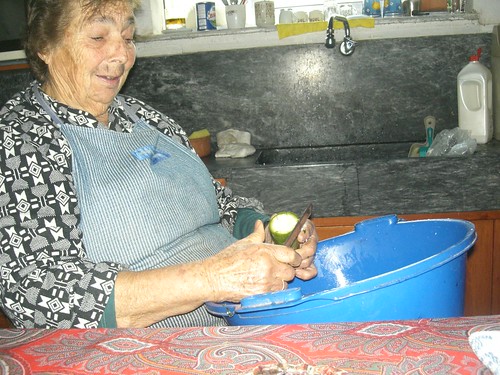
"There was never a sad moment in those days, not like now, when all you hear about is doom and gloom..."
©All Rights Reserved/Organically cooked. No part of this blog may be reproduced and/or copied by any means without prior consent from Maria Verivaki.
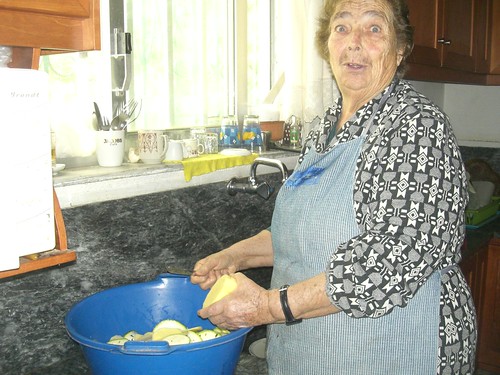
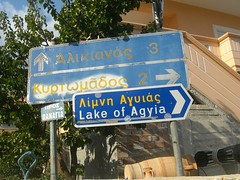
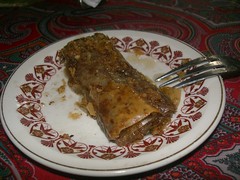

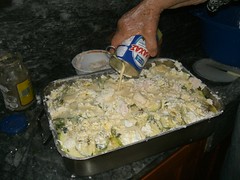
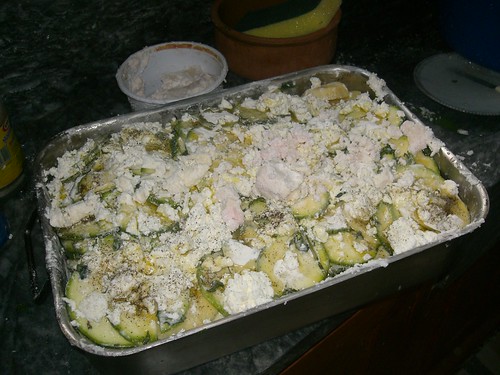



Thank you for sharing this story...it's wonderful to listen to family stories told by the older folks. I have to ask you a question though...why should God forgive Marika?
ReplyDeletewhen you hear a greek saying the name of a person and then God forgive him/her, it means they're deceased, so you hope god took them with him...
ReplyDeleteYou do know how to put things in perspective. All of us need to visit our roots, if only mentally, from time to time. Things have changed dramatically for most of us during the last 50 years - only , we don't always remember, and it isn't always for everyone.
ReplyDeleteThank you for sharing!
PS Thank you for the comments - it'll be an interesting experience!
The first portrait photo is just fantastic I love it... :-)
ReplyDeleteGreat post.
What a gift you have given to us by sharing your family and food! I am grateful and hungry for moussakka and pouraki! Thank you very much for your kind hospitality. Aloha-
ReplyDeletethis is woman from my village :D !! and dimitra it was a very funny and lucky woman but sad she is dead
ReplyDeleteηταν η θεια μου...
ReplyDelete